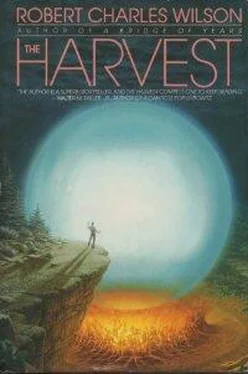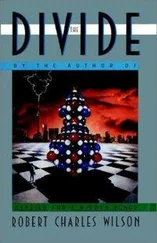Anyway, he told himself, I’m a man of some stature. A man who served his country, a man who made a place for himself in the business world. A man who had once been a familiar presence in the Capitol Building, a man accustomed to lunching with Defense Department functionaries or the members of oversight committees. Above certain kinds of innuendo.
That’s a joke, Sissy said. Another Washington crook. What’s the difference?
Tyler worked at remembering that period of his life. It had been structured, formal, complex. In those days he had known how to seal off this Sissy part of himself. Compartment A: The presentable Colonel Tyler. Compartment B: Certain phantoms. Certain urges.
But with Contact, the borders had grown tenuous. Like a naval vessel, he thought. Bulkheads breached. Flooding in the engine room. Fire in the hold.
The sad fact was, he talked to this ghost because he had no choice. Pay attention, Sissy scolded him. To…?
The danger! You can’t risk being exposed.
But even Colonel Tyler had dreamed of that green valley in Ohio. A gathering place, a new life—safety. A trap, Sissy said.
“But if not there,” Tyler said aloud, “if that’s not where we’re going…”
But when he turned to pose the question, Sissy had vanished.
* * *
They came across a fallen telephone pole blocking the highway. Tyler called a halt, then enlisted Joey Commoner and Chuck Makepeace to work a chain around the pole and hook it to the rear of the pickup.
Tyler revved the Ford’s heavy-duty engine, inching forward against the drag. The pole gave a moan of stressed timber and then began to shift.
Tyler took careful note of the people who had climbed out of their campers and RVs to drink bottled soda and watch the show.
Kindle and Wheeler stood together, both poker-faced. Wheeler in particular seemed to be working to disguise some emotion. His resentment, Tyler supposed, at being elbowed out of the leadership position.
Among the rest Tyler identified idle curiosity, some cautious frowns from the likes of Abby Cushman and Miriam Flett, frank idolatry from Joey Commoner.
He turned away to measure his progress, and when he looked again he was surprised to see Sissy among the crowd—a more ethereal presence.
A dry wind came rivering down this pass, but Sissy’s long, tangled hair hung limply over her shoulders; her layered clothes stirred not at all.
She extended her hand over the head of the new boy, William.
This one, Sissy said. Her lips moved soundlessly, but Tyler heard the words as if they were his own. Watch out for this one.
He drove until sunset.
* * *
“A lot of settlers came through here,” Kindle said. “Mormons, especially, but also people on the Oregon Trail, the California Trail. You can still find their wagon tracks on the scrub prairie about forty miles north.”
Matt walked with his friend along the highway away from camp.
They had stopped for the night along a stretch of high Wyoming rock desert that seemed to Matt infinitely dry, silent, and immense. Dinner was over now and the watch fires had been lit.
“Matthew,” Kindle had said, “let’s walk a bit. Get the kinks out.” And Matt understood that the older man had something difficult to tell him.
Neither moon nor Artifact had risen and the stars were bright in a cold sky. When he spoke, Kindle’s voice seemed to hover in the air.
“It was called the South Pass,” Kindle said. “You followed the North Platte to the Sweetwater, Sweetwater to Pacific Creek, Sandy Creek, the Green River Crossing. The Overland Stage Route came through that way. Pony Express.”
Scuff of shoes on empty road. Matt said, “Sounds like you know the territory.”
“Lived two years up in the Wind River Range. Did a lot of hiking through Whiskey Mountain and Popo Agie. Beautiful country.”
“You miss it?”
“Been thinkin’ about it a lot.”
They approached the small fire where Joey Commoner was keeping watch. Joey stood up at the sound of footsteps, turned to face them with his hand hovering at the pistol Colonel Tyler had supplied him.
“Halt,” Joey said, his voice cracking.
Kindle yawned and regarded the boy. “Joey, if you ever aim a loaded pistol in my direction I’ll feed it to you—fair warning.”
“The Colonel doesn’t like people outside camp perimeter at night.”
“I don’t suppose he does. I don’t suppose he likes my shirttail untucked, either, but he’ll have to put up with it, won’t he?”
“You go on report if you’re out of bounds.”
“Fine,” Kindle said. “Maybe later the Colonel can slap my wrist.”
“You’re such a shithead,” Joey said.
Kindle looked at him a long moment—sadly, Matt thought. Then they walked on, past the fire, past Joey.
Matt tried to imagine crossing this blank immensity in a covered wagon. No highways, no gas stations, no motels. No Helpers. The stars sharp as needles.
“Matthew… can you believe this bullshit? Pass a checkpoint before we can take a walk?”
He shrugged. “Joey’s just—”
“Joey isn’t ‘just’ anything. Joey’s following orders and loving every minute of it. We’re not living in a town anymore, we’re living in a barracks. That’s why—”
Kindle hesitated. Matt said, “Why what?”
“That’s why I’m leaving.”
No. “You can’t.”
Kindle was a shadow in the starlight, large and gray. “Matthew—”
“Christ, Tom, I know what’s going on as well as you do. Tyler did his little putsch, and now we have to live with it. It’s painful. But we’re still moving. Heading for a place where Tyler will be one small frog in a big pond. They’re holding real elections in Ohio. According to the radio—”
“When’s the last time you heard the radio? The Colonel’s got it locked up.”
“Beside the point. In Ohio, the Colonel won’t matter.”
“Don’t underestimate the man.”
“The bottom line,” Matt said, “is that we’re more likely to get there if you’re with us.”
“The bottom line is that it’s not my job.” Kindle selected a pebble and threw it into the darkness, an invisible trajectory. “Anyway—I never wanted to live in Ohio. Tell you a story. Once upon a time I hiked along the Titcomb Valley, that’s up in the Wind River Range. I was thirty-three years of age, and I thought that was pretty damn old. East side of the valley is Fremont Peak. North is Mount Sacajawea. At the head of the valley is Gannett Peak, highest in Wyoming. All well above the timberline. Glaciers on those mountains like blue rivers of ice. So pretty it hurts. I camped there a night. When I left, I promised myself I’d come back, one way or another, before I died. See all this a second time. I never got around to it.”
“Tom—”
“I know you don’t understand this, Matthew. You’re happy with people. Happiest when you’re helping them. That’s admirable. I can’t do it, however. I’d be happy by myself in the Winds. Or the Tetons, or the Beartooths.”
Matt tried to imagine this wiry, strong, aging man alone in the wilderness. “Break a leg out there,” he said, “no one comes to help.”
“I don’t relish the idea of dying alone. Who the hell does? But what choice is there? Don’t we all die alone?” He shrugged. “Used to be Shoshone and Arapahoe through there. Might still be people around.”
Matt said, “In Ohio—”
“In Ohio there’s nothing but people. People and Helpers. Which is another question. Seems to me there’s only two ways it can go, Matt. Maybe the Travellers move on and leave us alone—no Helpers, no electricity unless we make it ourselves. And pretty soon the planet is repopulated and we’re back in the same bind. Or else they build us a private Eden, which is pretty much what they promised. A safe place, a protected place, easy food and probably some kind of population control. And maybe that’s okay, too. But think about it. Everything the Travellers are capable of, doesn’t that qualify them as gods? I think it does—by the standards humanity’s used for thousands of years. But do you want to live with a god? A real one, I mean, one who appears in the sky every night? God who makes the rain fall, god who makes the crops grow, god who cures the sick child? What would we be after ten years of that—or a thousand years? Maybe about as human as those people who dropped their skins. Maybe less.”
Читать дальше












